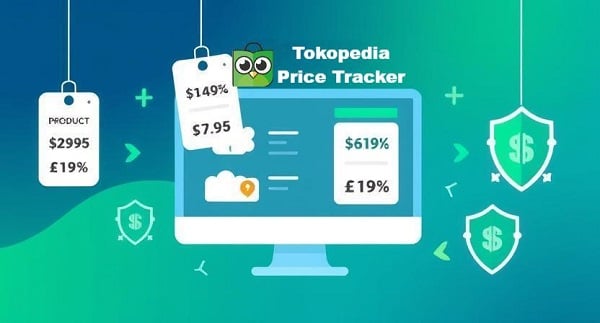How to Scrape a Whole Site: Step-by-Step Guide for 2026
Practical guide to discover, crawl, extract and store all pages safely — includes command-line, Python and headless browser examples.
Jan 12, 2026
Learn why tracking prices on Tokopedia pays off—and how GoProxy’s rotating residential proxies keep your alerts running smoothly at any scale.
Tokopedia is Indonesia’s e-commerce hotspot, with thousands of sellers, millions of listings, and daily flash sales that shift faster than you can blink. Whether you’re a shopper hunting for a deal or a business tracking competitors, keeping up manually is a slog. Enter the Tokopedia price tracker—a tool that does the heavy lifting, helping you snag the best price or gather market intel without breaking a sweat.
In this guide, we’ll walk you through:
Method 1: Plug-and-play tools for quick wins (no coding needed).
Method 2: A custom scraper with proxies for big-scale tracking.
Plus, we’ll explain why proxies matter and share best practices for both beginners and pros.

Tokopedia’s market moves fast. Prices jump, flash sales hit, and deals disappear. Here’s why a tracker is your ace:
Save Money: Catch a price drop before it’s gone. Imagine scoring a gadget 20% off just by timing it right.
Stay Sharp: Sales like Harbolnas or midnight promos can slash prices unexpectedly. A tracker keeps you ahead.
Make Smart Calls: Price history reveals if a “deal” is real or just hype.
Business Edge: Track competitors or spot trends across regions.
Example: A laptop stays at Rp 10 million for weeks, then dips to Rp 9 million during a midnight sale in Jakarta. A tracker notifies you immediately—no FOMO.
A Tokopedia price tracker is a tool—maybe a browser extension, app, or custom script—that monitors product prices on Tokopedia. It checks listings, logs prices, and can even alert you to changes. For beginners, it’s like a wishlist buddy; For pros, it’s a data goldmine analyzing trends at scale.
Perfect if you want up-and-running in minutes—no code required.
| Tool | Pros | Cons |
| Honey | Free; easy browser extension; Droplist | Not Tokopedia-native; manual setup |
| PriceTracker | Supports multiple sites; unlimited items | Lightweight UI; occasional misses |
| Keepa | Advanced charts (Amazon origin) | Requires manual URL tweaks; complex |
Your choice depends on your needs:
Casual Shoppers: Honey’s Droplist is free and simple—perfect for tracking a few items.
Power Users: PriceTracker lets you monitor multiple products with custom alerts.
Scale Seekers: Hit limits? Jump to Method 2.
1. Install Honey from the Chrome Web Store.
2. Visit Tokopedia and find your product (e.g., a Bluetooth speaker).
3. Click the Honey icon and hit “Add to Droplist.”
4. Set your target price (say, Rp 500,000) and choose alerts (email or pop-up).
5. Relax—Honey pings you when the price drops.
For a detailed guideline, please check our blog "Honey Price Tracker: Unlock Bigger Savings with Proxy IPs".
Be Realistic: Check past prices to set achievable alerts (no Rp 50,000 phones!).
Track Multiple Sellers: Same product, different prices—monitor a few.
Time It: Prices dip during sales (e.g., 11.11) or late nights.
Stale Updates: Manually refresh or switch tools.
Blocks: Too many checks might flag your IP. Proxies fix this (more later).

When you need to track thousands of listings across regions, a DIY scraper with rotating residential proxies is the answer.
Bypass IP Bans & CAPTCHAs: Each request comes from a fresh real-ISP IP.
Unlock Local Prices: Route through Indonesian endpoints (Jakarta, Surabaya, etc.) for region-specific data.
Unlimited Bandwidth: GoProxy’s unlimited plans remove data caps—scrape 100 GB or more without extra fees.
Install Dependencies
bash
pip install requests beautifulsoup4 playwright
playwright install
Sign up at GoProxy Unlimited Proxies, note your endpoints:
python
PROXIES = [
"http://user:[email protected]:8000",
"http://user:[email protected]:8000",
# …add more regions as needed
]
python
import random, requests
from bs4 import BeautifulSoup
HEADERS = {"User-Agent":"Mozilla/5.0"}
def fetch_price(url):
proxy = {"http": random.choice(PROXIES), "https": random.choice(PROXIES)}
resp = requests.get(url, headers=HEADERS, proxies=proxy, timeout=15)
resp.raise_for_status()
soup = BeautifulSoup(resp.text, "html.parser")
price_tag = soup.select_one(".price-tag-selector") # replace with actual CSS
return price_tag.get_text(strip=True)
python
from playwright.sync_api import sync_playwright
def fetch_dynamic_price(url):
with sync_playwright() as p:
proxy = random.choice(PROXIES).replace("http:/","")
browser = p.chromium.launch(headless=True, proxy={"server":proxy, "username":"user","password":"pass"})
page = browser.new_page()
page.goto(url, wait_until="networkidle")
price = page.query_selector(".price-tag-selector").inner_text().strip()
browser.close()
return price
python
import time
def get_price_with_retry(url, retries=3):
for attempt in range(retries):
try:
price = fetch_price(url)
if not price: price = fetch_dynamic_price(url)
return price
except Exception as e:
time.sleep(2 ** attempt)
return None
# Schedule with cron or Windows Task Scheduler to run hourly
Database: PostgreSQL, MongoDB, or simple CSV/Google Sheets
Alerts: send email/Slack when price ≤ target
Editor’s Tip: Fork an open-source GitHub script and plug in GoProxy endpoints—no deep coding needed.
Use a Tracker:
Newbies or time-crunched folks.
Tracking 1–10 items.
Build One:
Coders or scale seekers.
Tracking 10+ items with custom needs.
Pace Yourself: 1–5 sec delays between requests.
Mix It Up: Rotate user-agents with proxies.
Batch It: Split big lists into chunks.
Check Regions: Test Jakarta vs. Surabaya prices.
Log It: Save HTML for debugging.
A Tokopedia price tracker—from easy browser extensions to a proxy-powerhouse scraper—turns unpredictable deals into predictable savings. Start with Method 1 for quick wins, then scale up with Method 2 and rotating residential proxies to monitor thousands of SKUs across regions, block-free and bandwidth-unlimited.
Try GoProxy Rotating Residential Proxies and never miss a Tokopedia deal again. Sign up and get a 7-day free trial today. Unlimited plans await for serious trackers!
A: You can try, but they’re unreliable, slow, and likely to get blocked. Residential proxies have better success rates.
A: For fast-moving categories like electronics, track every hour. For others, 2–4 times a day is enough.
A: Basic Python knowledge helps, but many price tracking services offer dashboards. If you build your own, tutorials are available.
A: Look for one with Indonesian residential IPs, rotating functionality, and unlimited bandwidth—GoProxy and Oxylabs are good examples.
< Previous
Next >
 Cancel anytime
Cancel anytime No credit card required
No credit card required